Why does my tortoise bite me? Tortoises try to bite when they feel they are in danger. These docile creatures can bite as a result of hormonal changes. Other reasons to bite include hunger and territorial needs. It is also possible for tortoise owners to accidentally get bitten by their pet tortoise during hand feeding. Accidental bites or test bites are usually a tortoise’s attempt to figure out if something is edible or not.
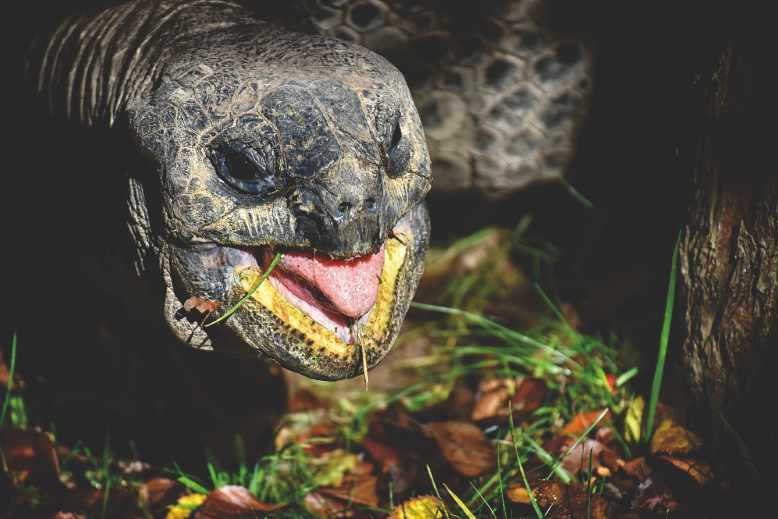
Generally, tortoises are peaceful and mild-manner reptiles. Watching these friendly pets trying to nibble your hand is a bit shocking and unexpected. However, like any other animal, tortoises also need a way to defend themselves. And biting and nibbling seem quite an efficient way for most reptiles to defend themselves from predators lurking in the wild. Though tortoises are versatile and easy-going pets, they are perfectly capable of using their strength to bite other pets and human companions for a variety of reasons.
Here we have listed some of the most common answers to your question,” why does my tortoise bite me?” read on to understand why exactly do your cold-blooded pets try to snap at you and how you can cope up with this destructive behavior.
Why does my tortoise bite me?
These majestically patterned reptiles only try to bite humans if they feel threatened or have mistaken human hands or feet for food. Although biting in self-defense is a little more obvious, but accidental biting is a bit strange. So, let’s start with this one.
- When a tortoise “test bites” or mistakes you for food
Tortoises are smart enough to understand the difference between humans and a piece of vegetable or meat. Yet under specific circumstances, they can mistake your hands and feet for something edible. Although most of these reptiles love to munch on vegetables, they may snap at your toe or finger, considering it something they would normally eat.
If you are a reptile lover, you must keep in mind that both tortoises and turtles are opportunistic feeders, whether wild or captive. When they see something that looks edible to them, they try their best to jump and nibble it with zero hesitation.
Tortoises can bite you if you try to hand feed them. Usually, it happens by mistake. They may mistake your gloves for food and simply bite them without any intent.
From our knowledge, if you wish to avoid getting your fingers and toes bitten, never walk without shoes in your tortoise’s enclosure. This precaution is especially necessary if the enclosure has patches of dense grass.
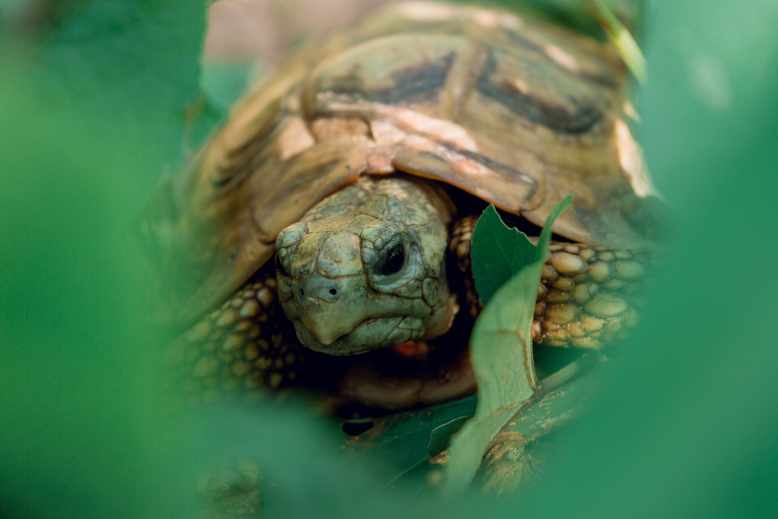
Now let’s move towards the next scenario when your captive tortoise can bite you.
- When a tortoise feels threatened
If your tortoise thinks he is in great danger and there is no way to escape the situation, he may think it’s better to attack first. Consequently, the fellow will try to bite you.
In general, tortoises aren’t social reptiles. They don’t like to be the first ones initiating any interaction, even if it is in the form of biting. This also means they don’t consider biting till the very moment they see you.
Scaring a wild tortoise is usually a no-brainer. Thereby, if you get too close to a tortoise that isn’t used to human interaction, the tortoise may consider you a threat that is about to attack. Although some tortoises may not necessarily think of you as a risk, but as soon as you touch them, they may either start running all over the place, hide in their protective shells, or may bite you.
On the other side, captive tortoises are used to human interaction. They usually don’t try to bite your hand or fingers off if you touch them. Yet, if you are being too rough in handling them, there is a pretty healthy chance that your tortoise will bite you. The chances of getting a tortoise bite are relatively higher if the tortoise has no place to run.
When we talk about handling captive tortoises, owners need to remember that the tortoise’s age and origin are particularly important. If the captive tortoise is aged, he must have spent quite a period under human interaction. Such tortoises don’t get scared that easily. Origin is another essential aspect of tortoise handling. If an older tortoise is from the wild, it will be much more defensive than a pet tortoise. Such tortoises have a higher biting tendency than the ones raised in captivity.
- You have a single male tortoise.
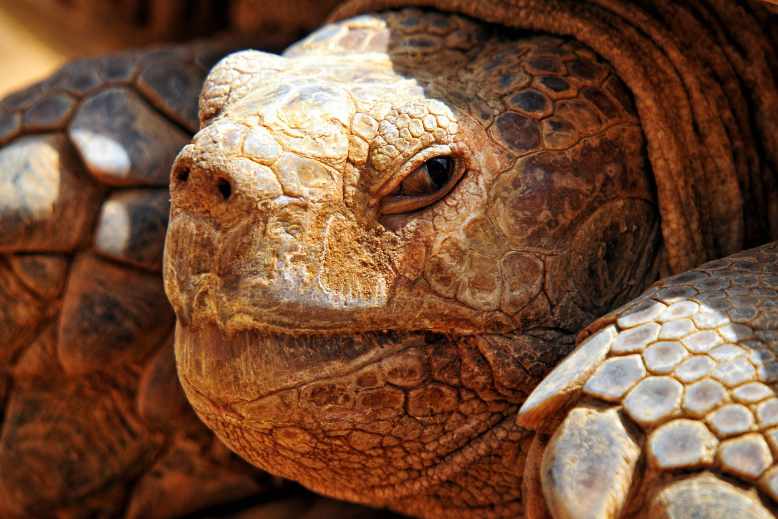
Unlike female tortoises, males have a stronger hormonal drive. These solitary animals are highly territorial, and their urge to mate can make them aggressive. Aggression due to sexual maturity is very common in male tortoises. So if you have kept a solo male tortoise, and suddenly he has started chasing and nipping your toes, then your pet might be experiencing hormonal aggression.
An easy way to cop up with this aggression is to get your tortoise a couple of females to share his territory with.
However, not everyone can, or wish to, adopt two or three tortoises. In this case, here is what you can do to alleviate the aggression.
For starters, you can reduce the temperature of your tortoise’s enclosure. Lower temperatures will trick your tortoise into thinking that the breeding season isn’t started yet.
Another way to fix this problem is to move your tortoise to a new enclosure. Moving gives your tortoise a new territory that he does not own yet. It can help decrease your tortoise’s desire to protect his area.
It is good to know that if you are about to move a group of tortoises, they are likely to show aggressive tendencies towards each other for a while to determine who has control of the new space. This aggression is just to find the dominant one. Interfering in such situations can make you a victim of their aggression.
- The food provided isn’t enough for everyone.
Food aggression is something that you can expect from a tortoise. Your pet will get aggressive if he is hungry. Try increasing the quantity of green to minimize the chances of having a “hangry tortoise.”
As tortoises prefer some food items over others, you may want to offer various food options.
- You are getting too close to their territory.
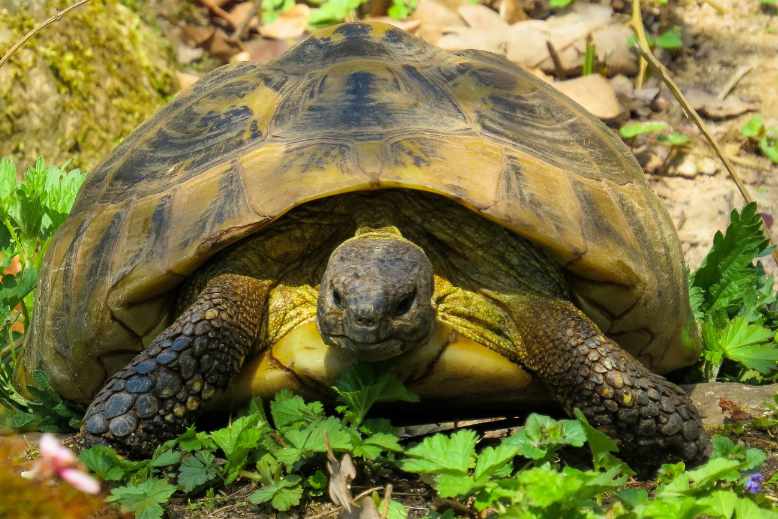
Tortoises are likely to view the enclosure as their territory. These pets consider themselves as the ruler of their own space. Getting into their space may make you a threat in your tortoise’s eyes, and the pet will display territorial aggression.
To reduce this violent behavior, try interacting with your pet outside his territory. Most pets like to claim a spot as their own. So try to be respectful of their territorial boundaries and stay out of the places where your tortoise prefers to hide.
- There is no enrichment in the enclosure.
Tortoises can be aggressive if either their enclosure is too small or there aren’t any toys to work off the excess energy. Try putting some toys to see if it helps your pet to calm down. This solution also helps if your male tortoise is hormonal and you don’t want to add any females in the enclosure.
- Hormones
In the wild, male tortoises proclaim their dominance by biting each other. Your solo male tortoise, though, may not try to bite your toes off when you first get it; as soon as it reaches sexual maturity, you may see an aggressive change in its behavior.
Now that we know when a tortoise can bite you, let’s figure out if a tortoise can bite other tortoises.
Do tortoises bite each other?
Well, a simple answer is yes! Tortoises display the same energy towards their species. You can expect a tortoise to bite other members of his species. Some of the reasons a tortoise can bite another tortoise are mating, dominance, tortoise fight.
- The most common reason why a tortoise is known to bite is dominance. It usually happens when two male tortoises are placed in the same area. Thereby when these tortoises are settling their disputes, they are likely to bite each other. While conflicts are common amongst male tortoises, females can also get into these disputes.
- When it comes to mating, it is often observed that male tortoises bite females while mating. First, both genders get into a fight, and then they mate.
- Another obvious reason behind a tortoise bite is self-defense. When tortoises get into any disagreements, they like to sort the matter out with their jaws.
- In extreme circumstances, a strong tortoise can literally take a bite out of its relatively weaker counterpart. Tortoises can also turn to cannibalism if there is no food available and they are hungry.
How much is a tortoise bite force?
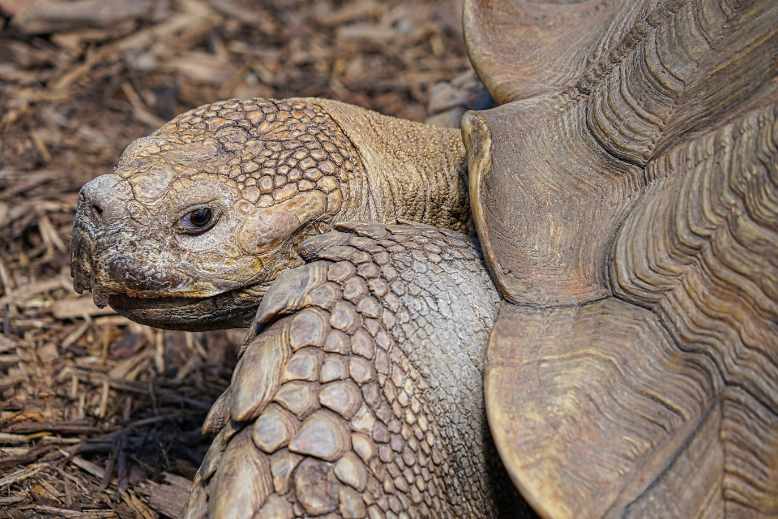
The fact that a tortoise can bite and, in rare cases, eat other tortoises brings us to the question, how much is a tortoise bite force? Does it really hurt that bad?
Considering that tortoises don’t have any visible teeth, many people assume that their jaw strength can’t do much damage. After all, why does your tortoise need such strong bites to devour some soft leafy greens?
Well, we should never underestimate the strength of a tortoise jaw.
While tortoise bite force mainly depends on the type of diet a specific species adheres to, carnivorous tortoises bites are extremely painful and can cause more damage. Unlike herbivore tortoises, carnivorous are likely to break human skin. And with the right amount of force, they can even take our fingers off.
Herbivore tortoises, too, have a pretty strong tortoise bite. But it isn’t that severe, and you are likely to have a pinching feeling. The spot where they bite may display a red mark for several hours, but it will go away after some time.
Tortoise bite treatment
If you have just had a small tortoise bite, immediately wash the affected area in soapy water and leave the tortoise alone. If the skin is damaged or broken, contact your trusted doctor and seek his advice.
In case you see any blood, stop whatever you are doing and disinfect the wound. Even if the damage is small, it can get infected, which can be way more serious. We would also recommend visiting a doctor after you have disinfected your wound.
If you are bitten by a stubborn tortoise who simply refuses to let go, wait until the tortoise releases the bite. Do not exert any force as it can worsen the situation. It may seem silly, but it is the best way to act in such circumstances. The tortoise will eventually let go. But if he doesn’t, try pouring some water on it carefully.
What not to do if you are getting bitten by a tortoise?
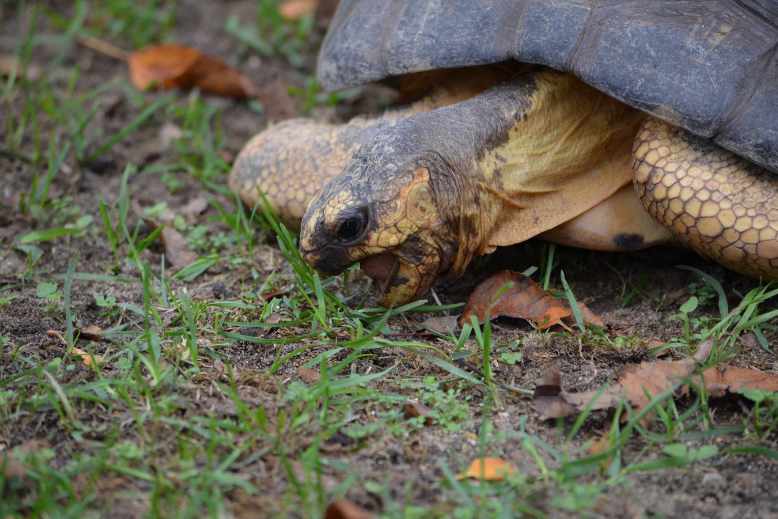
If you are bitten by a tortoise who doesn’t want to let go, do not pull or hit the shelled reptile. Hitting can only make the tortoise apply more pressure. If you hit the cold-blooded pet until it loses its consciousness or life, the situation will only get worse for you. Because in such situations, the jaws will apply more pressure, and even the tortoise can’t release it. So, the best thing you can do is to wait until the pet releases its bite.
Final Thoughts
In general, tortoises have a reputation for being peaceful and calm. Normally they have a motive for biting. Therefore, it is critical to understand the reason for biting to stop it. If your tortoise is new, it may bite out of stress. Change in the environment and surroundings can make a tortoise anxious, and the fellow may bite.
If this is the case with your tortoise, give the pet some time to get used to its environment. Avoid unnecessary interaction and only approach the tank to offer food and water supplies for a couple of weeks. Give your tortoise enough time to get accustomed to its new habitat.
If your tortoise test bites you, avoid hand feeding. Also, try not to walk near your tortoise without shoes on.
Lastly, always handle your tortoise with great care. If you take care of your tortoise, there is no chance of getting a tortoise bite. Just avoid placing your hand anywhere near your tortoise’s mouth.




